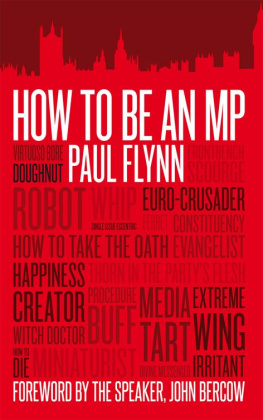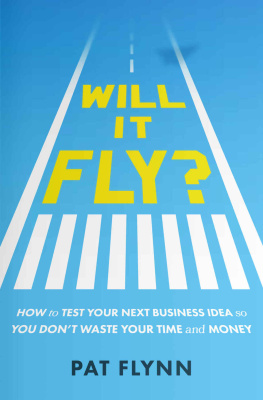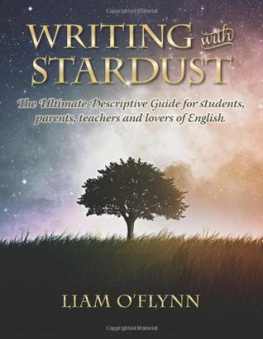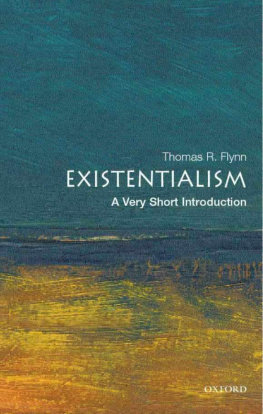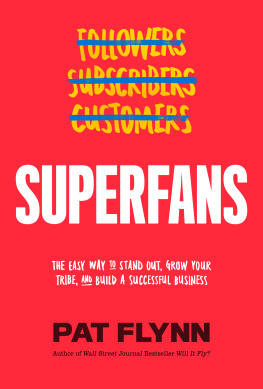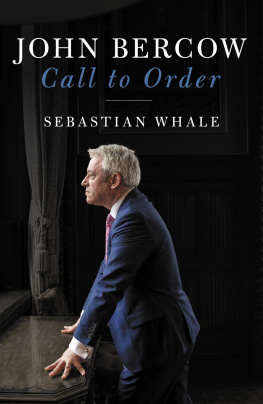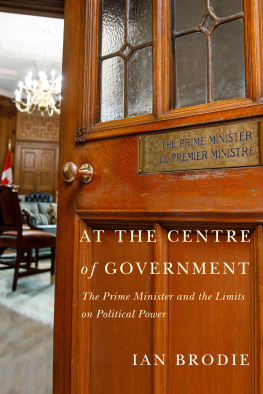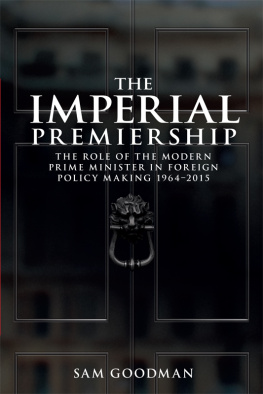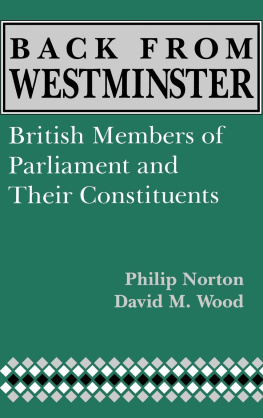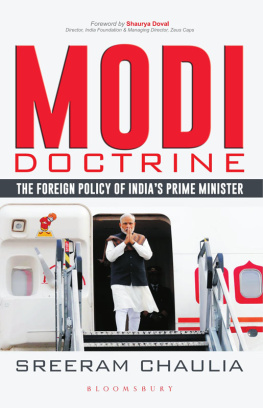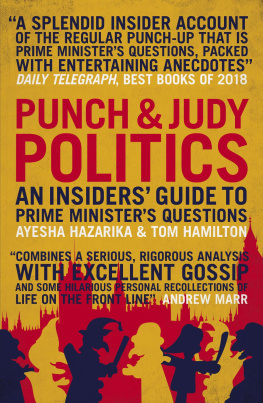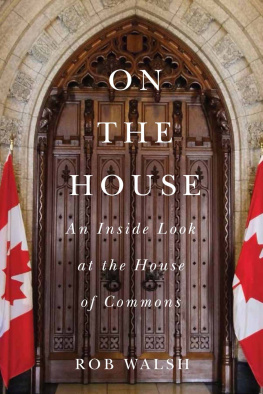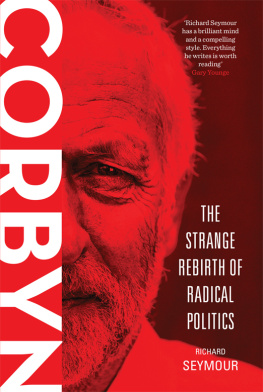T he Expenses Scandal, the Wright Reforms and the Bercow Speakership have transformed Parliament. This new volume attempts to wrestle with the bewildering problems ahead while retelling some of the best-loved lessons from the past.
Thanks to Madeleine Moon and other colleagues who have persistently encouraged me to write a new edition of CommonsKnowledge. My team Jayne Bryant, Lisa Eynon and Sam Flynn have inspired with fresh ideas and wise advice. Parliament has been a great teacher for this backbencher. There is much still to learn.
B y background a chemist in the steel industry, a community broadcaster, a political researcher and a councillor, Paul Flynn has proved to be a tenacious, resourceful and independent minded Member of Parliament for Newport West. Always a supporter of, but never a slave to, his beloved Labour Party, Paul is one of those MPs who entertains a wide range of political interests and has pursued them unwaveringly according to his own lights, irrespective of the received wisdom of the Government or the Official Opposition at any particular time. Health, drugs policy, social security, animal welfare, constitutional reform, Afghanistan and opposition to the Trident missile system are but a few of the issues on which he has been an outspoken and passionate campaigner. Following a brief spell on the opposition front bench, which ended over two decades ago, Paul Flynn has devoted himself to being an effective backbench parliamentarian. He has acquired significant experience on parliamentary committees and continues to serve with the Public Administration Select Committee and the Political and Constitutional Reform Committee. Yet he is best known for his witty, incisive and often provocative questioning in the Chamber of the Commons of ministers in successive governments.
Few people can be better equipped to write on how to be an MP. Using a combination of anecdotes drawn from personal experience , historical references and astute perceptions, he manages to capture the practical issues and challenges of political life with good humour, affection and insight. He has seen it all, said it all and done it all in his time and can pass on many clear-sighted words of wisdom to others who want to enter the political fray at Westminster. For those that dont, this book is an entertaining and fascinating account, giving the unvarnished truth about life for an MP and all the compromises and difficulties that entails. His thoughts on the impact of the new intake of MPs since the 2010 election and the reforms that have helped breathe new life into parliamentary scrutiny are an encouraging indicator that we are heading in the right direction.
He tackles many of the challenging issues head on, such as in his sections on How to Restore Trust, How to Switch on Young Voters and How to Deal with Disaster. But perhaps his greatest skill is to convey the complex, infuriating, exhausting but ultimately compelling life of an MP. I thoroughly recommend this book with one exception, because a Speaker cannot possibly commend a section entitled: How to be a Hooligan!
I trust you will enjoy what should be a stimulating and rewarding read.
John Bercow
January 2012
How to Arrive
MP
Y ou have earned two vibrant letters that inspire pride, hope and trepidation.
Once they were an accolade. Now they can be an albatross.
They are your Open Sesame into a privileged freemasonry of 650 legislators who are loathed and loved in unequal measure post-expenses scandal now more loathed than loved by the rest of the population. Difficult choices are ahead. Will you be a Tiger or a Bagpuss? A Roundhead or a Cavalier?
Heart a-flutter you journey to Westminster. Family, friends, your adoring constituency party, purring happiness, waved you off on the odyssey they believe will eventually lead you in triumph to No. 10. Or not. You are about to enter a monastery with glass walls through which the jackals of the tabloids will watch your every twitch and sniff. Following the expenses scandal, ignominy and prison are terrifying alternative destinations.
In your previous career you may have enjoyed high status. Here, captains of industry, acclaimed academics and lions of charities or trade unions are all reduced to apprentice sprogs. Its up to you to adorn your blank page.
It can be an intoxicating experience. After the giddy whirl of the election campaigns adrenalin, sleep deprivation and fatigue, the mood swings into breathless bewilderment and euphoria.
There are consolations. Gone is the past indifference and even hostility that once cold-doused arriving parliamentary virgins. The massive 232 in the 2010 intake have been the first generation of new MPs to be cosseted and cuddled into Parliament. They were ushered up to the first floor of Portcullis House and given their parliamentary pass, a laptop, a Blackberry and a twenty-minute induction on the new expenses system. First contact with the scary Independent Parliamentary Standards Authority (IPSA) is at hand as MPs are walked through the bewildering online claim forms and given detailed explanations of parliamentary etiquette.
A guidebook reveals all, including how to order stationery, make friends with the Order Paper and what to do in case of a chemical or biological attack. Soon the weight of information-overload baffles. The sense of an out-of-body experience wilts the spirit.
A common mistake is to drop into the Commons Post Office and ask if there are any letters. There will be hundreds of constituents eager to test the mettle of new MPs. A high proportion will be hopeless cases that have sought solutions for their intractable problems for years.
A new MP is a celebrity in their constituency; in the Commons a mere insignificant one amongst 650. One Member of the 2010 intake described the frustration she felt during her first few weeks at having to negotiate labyrinthine corridors that all look the same and work from a table in a cafe until she was finally given an office. Old lags will endlessly droll on about how they had to put up with a desk in the corner of the Library for their first ten years. But it has improved. Now, all new MPs will have an office, probably shared at first. The omnipotent whips distribute space. The pinnacle of office accommodation is Portcullis House, only accessible to frontbenchers or senior MPs, but it is a trade-off between proximity to the Chamber and size. A broom cupboard without a window above the Commons Chamber is the equivalent of an office the size of a double garage in far-flung Norman Shaw. Those who fall for the lure of space may regret it. On countless future occasions the penalty will be a breathless dash in the rain from an outbuilding to reach the division lobby in the eight minutes allowed. The airless padded cells above the Chamber are tempting. Empty, they may look adequate but the free space will shrink to Lilliputian dimensions when the furniture, files and staff move in

